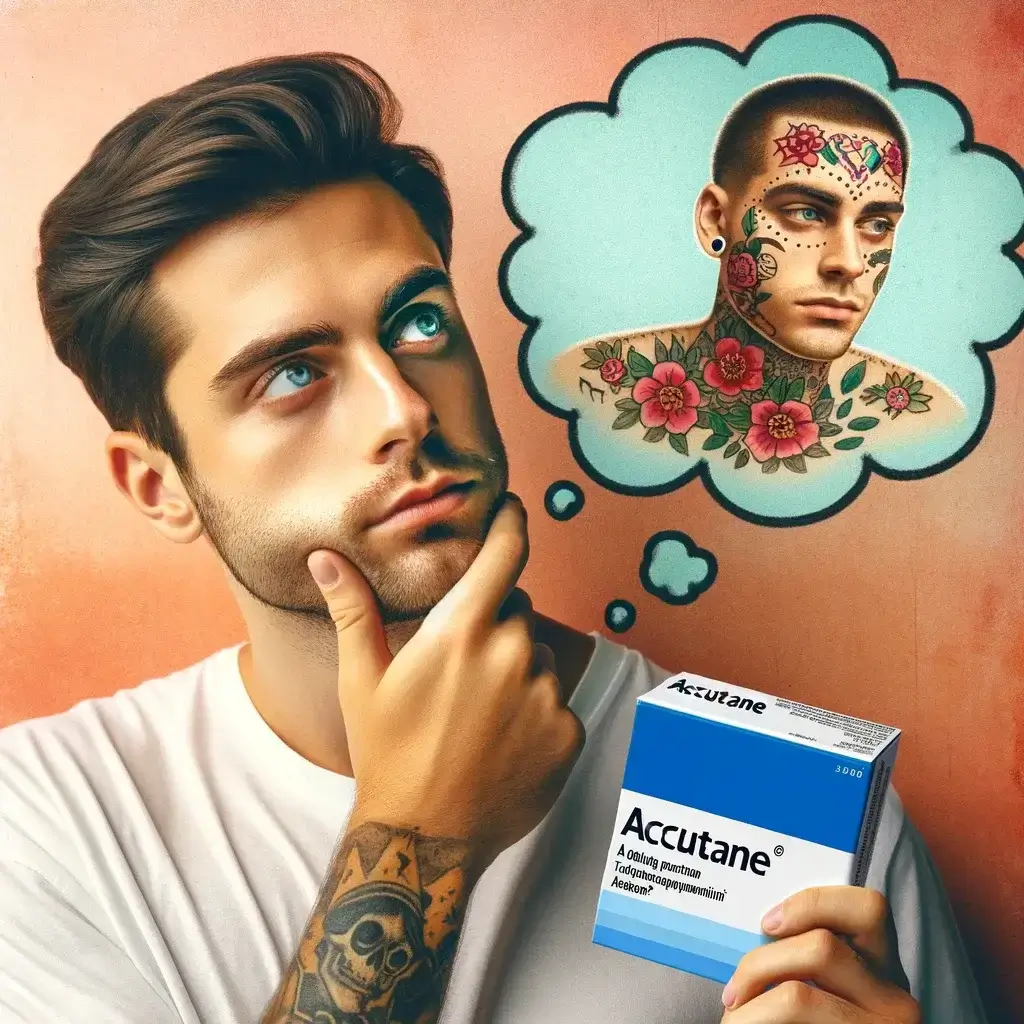In our world, where tattoos are a popular and fashionable form of expression, the question of “how long after Accutane can you get a tattoo?” resonates strongly.
This query is significant in an era where the trend of obtaining these lovely marks of uniqueness has become dominant in many western countries.
As these permanent symbols of expression become more common and accepted in society, the reasons for getting tattoos vary, but the concern for how medications like Accutane, known for making skin sensitive and easily infected, affect the process is universal.
In our present day, balancing the desire for a fashionable statement with health and safety is crucial, especially when considering the negative influences of rushing into tattooing in a space where aggressive treatments have been recently used.
As acceptance grows, ensuring that regret doesn’t follow is paramount for anyone looking to express themselves through this art form.
Also Read: Can You Get A Tattoo On Accutane
How Long After Accutane Can You Get A Tattoo?
Understanding Accutane’s Impact On Skin And Tattoo Timing
Accutane, a powerful retinoid drug affecting sebaceous gland function, is a go-to for many dermatologists treating persistent acne.
Its aspect effects, particularly how it modifies the skin’s healing ability, play a crucial role in the aesthetic and medical considerations of getting a new tattoo.
Experts typically advise waiting a year as a rule of thumb to allow the skin to strengthen after Accutane thins the epidermis.
This is not just an arbitrary guideline but a medically advised waiting period to ensure the skin is not unworthy of the needle’s puncture and the ink’s permanence.
For patients who’ve been on this medication, it’s imperative to understand that your body’s largest organ needs ample time to recuperate, especially before undergoing surgical procedures or something as invasive as tattooing.
Also Read: What Lotion Not To Use On A New Tattoo

Planning Your Tattoo Journey Post-Accutane
When you’re post six months to a year after your last dose of Accutane, it’s time to consider scheduling a consultation at a reputable tattoo studio.
Here, the use of sterile needles and high-quality inks can be done safely, and renowned tattoo artists will understand the course your skin has been on.
They’ll likely recommend you wait a minimum of six months, but this can extend up to 180-210 days for those on a heavy dosage.
For individuals on a low dosage, the wait might be shortened to about 90 days, but never less than five days post-treatment.
Always prevent haste in getting inked and schedule discussions with both your tattoo artist and dermatologist.
This ensures that your skin is not only ready but also in optimal condition to embrace the artistic expression you desire, reflecting both your aesthetic values and medical safety.
Also Read: Can I Put Fake Tan On A Week Old Tattoo Safely
Why Do You Have To Wait 6 Months After Accutane?
Accutane’s profound relationship with skin health is a critical factor to consider when planning for tattooing.
The medication effectively dries out the skin, making it problematic for tattoo procedures.
When the skin is dry and flaky, the stencil doesn’t adhere properly, leading to flakes of skin disrupting the needle’s path and affecting the line work.
Starting the tattooing process immediately after treatment can lead to breaking the skin’s barrier, which significantly increases the risks of infection and allergic reactions to the pigments and inks used.
The thinning effect of Accutane on the skin means that it becomes thinner, more sensitive, and akin to being chewed up by the tattoo needle, which can cause more pain and lead to an unpleasant healing process.
This thinner skin might cause the ink to be placed too deep, raising concerns like blood poisoning, or too shallow, where the ink particles fail to remain in the intended spot.
This can result in a tattoo that looks splotchy, half-disappeared, or a complete mess that needs to be re-inked.
From this perspective, it’s clear that waiting the suggested six months to a year is essential.
This timeframe allows the skin to heal and regain a thickness that can handle the tattooing process more effectively, decreasing the odds of a bad result and long-standing regret.
The standard of waiting isn’t just an arbitrary rule; it’s a crucial preparation action to ensure your tattoo looks good and your skin remains healthy forever.
Also Read: How Long After A Tattoo Can You Tan Without Risk

FAQs About How Long After Accutane Can You Get A Tattoo
1. Can You Get A Tattoo On Accutane?
Getting a tattoo while on Accutane or similar medications like tetracycline, minocycline, or doxycycline is not recommended. Accutane makes the skin extremely sensitive and can compromise the healing process of the tattoo. It’s crucial to wait until the medication’s course is finished and it’s cleared from your system before considering a tattoo.
2. Can You Get Tattoos Over Acne?
It’s generally advised not to get a tattoo over active acne. During a breakout, the skin is more vulnerable, and the tattooing process can spread bacteria and potentially worsen pimples. It’s best to wait until the acne resolves safely before proceeding with any ink.
3. Can You Get A Back Tattoo With Acne?
For those with acne-prone skin, especially with active breakouts, getting a tattoo on the back or any affected area can lead to damage and spread bacteria. The ink may not settle properly, and the process might exacerbate skin issues. It’s safer to wait until the skin is clear.
4. How Long Does It Take For Accutane To Leave Your System?
Accutane (isotretinoin) has an elimination half-life of about 10-20 hours, but it can take much longer to be completely cleared from the system. Typically, it is advisable to wait at least a month after stopping Accutane to consider getting a tattoo, as lingering side effects may affect the skin’s healing capacity. Women should be particularly cautious if planning to become pregnant after stopping the medication.
5. Can I Get A Tattoo Before Accutane?
Getting a tattoo before starting Accutane, tetracycline, minocycline, or doxycycline as an acne medication is generally safer than during or immediately after. However, be aware that once you start the medication, your skin will become more sensitive. Discuss your plans with a healthcare provider before beginning the course of treatment to ensure the best care for your skin and tattoo.
6. Can I Get A Tattoo 2 Months After Accutane?
It’s generally advised to wait longer than 2 months after completing a course of Accutane (isotretinoin) before getting a tattoo. The skin remains fragile, and procedures like tattoos, waxing, dermabrasion, laser treatment, and other non-urgent skin surgeries or body piercings should be avoided to allow the skin to fully recover.
7. Can I Get A Tattoo 5 Months After Accutane?
Waiting 5 months after finishing Accutane (Isotretinoin or Roaccutane) may still be too soon for a tattoo or microblading procedure. The skin could still be recovering from the trauma of the medication, even if you have completed the course. Consult with a dermatologist to assess your skin’s readiness.
8. What Happens If You Get A Tattoo After Being On Accutane?
After being on Accutane, tetracycline, minocycline, or doxycycline, your skin may have heightened sensitivities, making the tattoo process more painful than normal. Post-acne medication skin requires time to adjust, and not giving it enough time might lead to a more painful and complicated healing process.
9. Can You Get A Tattoo On Acne Medication?
On Accutane, Retin-A, or other acne medications, your skin condition is altered and may not heal from a tattoo as expected. It’s important to wait until your treatment is fully completed and your skin has normalized before tattooing, to ensure safe and effective healing.
Final Thoughts
In conclusion, the question of “how long after Accutane can you get a tattoo” is one of significant importance for those considering body art post-acne treatment.
It’s clear that while tattoos are a powerful form of personal expression, the timing of getting inked after using medications like Accutane, tetracycline, minocycline, or doxycycline must be approached with caution.
As Accutane alters the skin’s sensitivity and healing ability, a waiting period of generally six months to a year is advised to ensure the skin has sufficiently recovered.
Consulting with healthcare professionals and considering individual healing times are crucial steps. Ultimately, prioritizing the health and readiness of your skin will lead to a safer tattooing experience and more satisfying results.
You May Also Like To Read:
- Discover How Long To Leave Tegaderm On Tattoos
- Can You Get A Tattoo On Accutane
- Find Out How Soon After Laparoscopic Surgery Can I Get A Tattoo
- Is Dermasil Good For Tattoos
- Why Is My Tattoo Shiny
